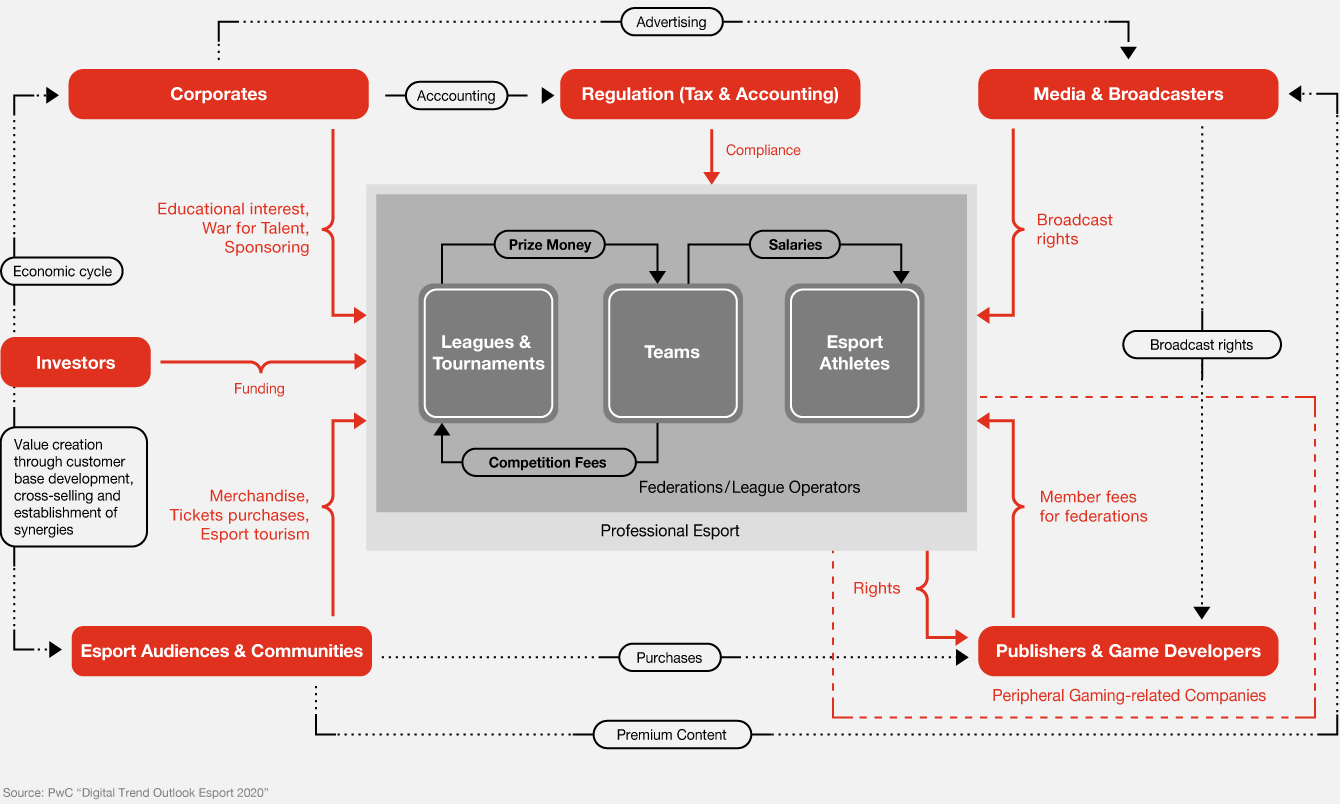
Your expert for questions

Werner Ballhaus
Global Leader Entertainment & Media, PwC Germany
Tel.: + 49 211 981-5848
Email
The esports ecosystem is growing rapidly
There are seven key groups that have a major influence on the esports ecosystem: teams & esport athletes, leagues & tournaments, esport audiences & communities, publishers and game developers, media & broadcasters, corporates and investors. Our PwC study "Digital Trend Outlook: Esports 2020" is an update of our 2019 study. It analyzes all of the relevant stakeholders within the ecosystem of the esports market in Germany – and describes the major trends and developments, as well as the biggest challenges and most attractive opportunities in this growing market.
Overview
Sponsoring and broadcasting revenues are driving growth in Germany
The market for esports in Germany grew by 26.7 percent from 2018 to 2019, to reach a total value of 77.2 million euros. Sponsoring and broadcasting rights are still the main sources of this growth, and remain the easiest and most visible opportunities for non-endemic brands to participate in this market. In 2019, sponsoring revenue for the esports industry in Germany reached 30.3 million euros, while media rights revenue in Germany reached 18.3 million euros. Gaming tournaments still play a key role in raising the popularity of esports and attracting sponsors. Selling broadcasting rights remains a crucial revenue driver for the esports ecosystem, even though many events are still free to watch, and we expect the growth in revenue from broadcasting rights to accelerate. On top of this, there is now a clear trend for sponsors to collaborate closely with esports teams and organizations to create added value for their target groups through more dedicated products, services and experiences. This is expanding the economic ecosystems within this industry.
Increasing complexity and professionalization
Teams and league operators within the esports ecosystem are building their own economic sub-ecosystems, which is making this market more complex. Successful esports organizations do not purely rely on sporting success. They also work closely with sponsors to create value for their target groups in an increasingly broad range of ways. This includes the development of new products or services, for example, jointly developing clothing lines, but also suitable insurance policies for gaming equipment or educational offerings that offer career prospects in the esports ecosystem. As the industry grows, new esports teams will continue to enter the ecosystem, which will create new opportunities for investors, partners and sponsors to participate in this market. Of course, truly successful esports organizations need a clear and differentiated brand identity, as well as a consistent strategy and set of business objectives. And they also need to identify the optimal target operating models and build strong organizational structures. That is why there is a clear trend for increased professionalization, with organizations learning from structures that have been effective in traditional sports and adding their own fresh ways of operating and developing their businesses. This is adding to the rising importance of professional approaches to accounting and tax.
Fans, game developers and publishers are the key players
The esports ecosystem depends on attracting fans and making them feel entertained and inspired. The evolution of streaming and its low barriers have created a range of options for people to discover and access esports content, and it is essential to maintain these structures. This is because esports is characterized by a unique culture that is built on strong social interactions and feelings of togetherness as the audiences share special moments while feeling like they are part of the action. Esports organizations are tapping into this by giving fans deeper insights into their favorite gamers playing League of Legends, Counter Strike: Global Offensive, Dota 2, Fortnite, Rainbow Six Siege or FIFA – and the emotions they feel while competing. Gamers communicate a “one of us” mentality to fans and aim to be approachable by appearing at events like the Gamescom trade show, the League of Legends Worlds, The International or the Intel Extreme Masters. On top of this, platforms like TikTok, Twitch, YouTube, Reddit and 9gag provide additional opportunities for fans to interact with gamers. These channels have taken on additional significance during the Covid-19 pandemic, as in-person events are cancelled around the world. Beyond these channels, there is rising demand for platforms that allow fans to decide what they want to watch, and when. Alongside the fans, publishers have a significant impact on the Esports ecosystem because they own Intellectual Property (IP) rights. Publishers are investing millions in their leagues to attract more in-game advertising, and there is a clear trend for more digital advertising in games. In 2019, advertising revenue from streaming in Germany was worth 12.9 million euros. Overall, publishers and game developers are still the most influential players in the industry. They pursue different goals in terms of market penetration, market development, diversification and product development, depending on the number of users and viewers of certain games.
The rising importance of tax, accounting and regulation
This year’s report places a special spotlight on tax and accounting practices in the esports industry. In addition, we have shifted our focus from governments to regulation. These changes to the format of our study aim to provide stakeholders across the esports industry with content that directly supports them in complying with relevant legislation and managing their obligations related to tax and accounting. The esports industry features a high volume of startups and small companies that are still developing their internal control systems, while also navigating the tax implications of being part of a digital economy rather than a physical, bricks-and-mortar industry. The information in the 2020 issue of our study addresses these issues directly – and aims to provide clarity and create value.
A valuable and rapidly growing market with a strong future
The continuous growth of the esports industry is attracting investors, and venture capital firms remain the most significant group. This is largely because many developing esports organizations still need a clear strategy to achieve profitability, which causes later-stage investors to hesitate before entering this niche market. Strategic investors see professional players and teams, as well as the millions of fans who cheer for them, as a great opportunity to generate brand value and revenue – and a direct channel that they can leverage to reach the younger generation. The easiest way to invest in esports is to buy stocks in the big publishers, or to invest in tournaments that are attended by thousands of gamers in person and tens of thousands more virtually. Industry experts predict that the three most marketable sports in the future will be soccer, basketball and esports, and esports are expected to feature at the 2022 Asian Olympics and perhaps also at the 2024 Olympics in Paris. Overall, the cost of investing in esports is lower than traditional sports, so now is a good time to invest.
Who are the key participants in the esports ecosystem? Why are economic ecosystems a driving force behind the development of this industry? How are esports titles developing and what is the intention behind this development? And why is social interaction still the key factor of success within this virtual world? Our study has the answers to these questions – and many more. We hope you enjoy reading it!

Voices of the experts

Interview: Esport organization hyperdrive - how to stand out from the rest and what is ahead
Esport organizations with their different teams are a key player in the esports ecosystem. Even though the market is still developing, some esports organizations differ significantly in terms of competitive and economic success, professionalism and unique selling proposition. This is exactly what Gian Luca Vitale discussed recently with Sabrina Ratih. The managing director Value of We and business development at G2 Esports explains in the interview why organizations need to stand out in the market, how to grow with business partners and why they should never forget about the commmunity.

Interview: Professionalization of Esports through sustainable and continuous support of talents and top athletes
The esport market is on the rise. To ensure that it will continue to grow sustainably in the future, it is important to support, grow and promote new talents and esports athletes on all levels. Gian Luca Vitale had the chance to sit down with Jörg Adami, former chairman of the Deutsche Sporthilfe and today managing director of the Esport Player Foundation (EPF), to talk about the role of the institution in the esports ecosystem, their vision for the future and why this is an essential for the professionalization of the esports ecosystem.
Contact us

Werner Ballhaus
Global Leader Entertainment & Media, Partner, PwC Germany
Tel: +49 211 981-5848


Gian Luca Vitale
Gaming & Esports Business Advisory, Senior Associate, PwC Germany
Tel: +49 175 8534-794


Contact us








